Search
- Page Path
-
- HOME
- Search
- Original Article
- Pulmonology
- Oligohydramnios affects pulmonary functional/structural abnormalities in school-aged children with bronchopulmonary dysplasia
- Jeong Eun Shin, Soon Min Lee, Mi-Jung Lee, Jungho Han, Joohee Lim, Haerin Jang, Ho Seon Eun, Min Soo Park, Soo Yeon Kim, Myung Hyun Sohn, Ji Ye Jung, Kyung Won Kim
- Clin Exp Pediatr. 2024;67(5):257-266. Published online April 16, 2024
-
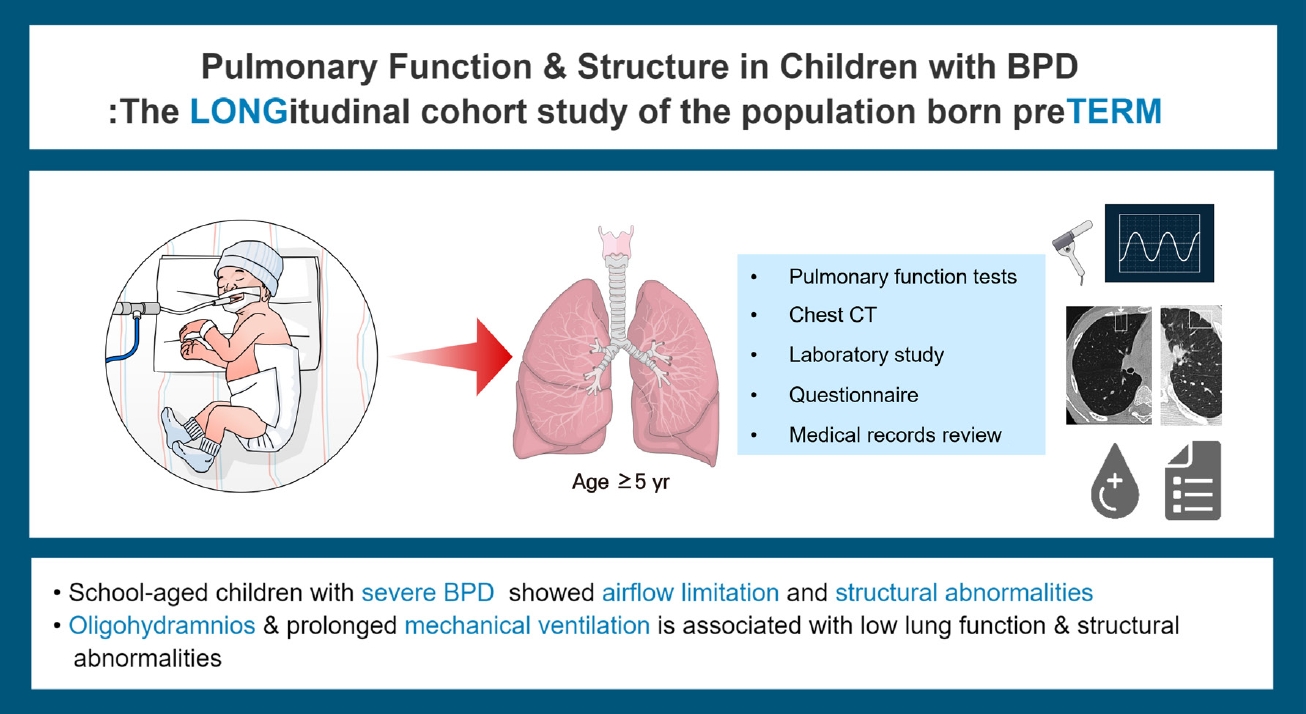
Question: Is bronchopulmonary dysplasia (BPD) associated with functional/structural abnormalities later in life?
Finding: School-aged children with severe BPD had abnormalities on pulmonary function tests and lung computed tomography despite no subjective respiratory symptoms; however, only prenatal oligohydramnios and prolonged ventilator use were associated with abnormal lung function.
Meaning: Long-term monitoring of preterm infants’ lung health is essential, especially for those with prenatal oligohydramnios or prolonged ventilator use.
- Review Article
- Incidence, causative organisms, and risk factors of bloodstream infections in pediatric liver transplant patients: a systematic review
- Mohamad Shieb, Rand Hasanain, Zara Arshad, Faisal Nawaz, Rahul Kashyap, Eric Stern
-
Bacterial bloodstream infections (BSI) are the leading cause of mortality and morbidity in pediatric solid organ transplant recipients. This systematic review aimed to pool global data from leading transplant institutions and identify the overall incidence, risk factors, and causative organisms of BSI in pediatric liver transplant recipients. A systematic review of the PubMed and OVID databases was conducted from 2000... -
DOI: https://doi.org/10.3345/cep.2023.01466 [Accepted]
- Original Article
- Neonatology (Perinatology)
- Effect of vitamin E supplementation on bilirubin levels in infants with hyperbilirubinemia: a double-blind randomized clinical trial
- Mojtaba Cheraghi, Maziar Nikouei, Majid Mansouri, Siros Hemmatpour, Yousef Moradi
- Clin Exp Pediatr. 2024;67(5):249-256. Published online March 26, 2024
-

Question: Is vitamin E a viable therapeutic option for managing neonatal hyperbilirubinemia?
Finding: This randomized clinical trial examined the effects of oral vitamin E supplementation on bilirubin reduction (primary outcome), phototherapy duration, and length of hospital stay (secondary outcome) in 138 infants.
Meaning: Infants administered vitamin E versus placebo demonstrated similar reductions in bilirubin levels and length of hospital stay.
- Nutrition
- Effect of probiotics plus zinc supplementation on clinical outcomes of infants and children with acute infectious diarrhea: a randomized controlled trial
- Deldar Morad Abdulah, Saad Jbraeil Sulaiman, Zaid Waad Ahmed
- Clin Exp Pediatr. 2024;67(4):203-212. Published online February 19, 2024
-

Question: Does zinc supplementation along with probiotics affect disease severity or clinical outcomes of children with acute diarrhea?
Findings: This study indicated that zinc supplementation and probiotics had no effect on clinical improvement or disease severity among pediatric patients with acute diarrhea.
Meaning: Children who received probiotics plus zinc recovered faster than those who received probiotics only.
- Cardiology
- Effect of face mask on pulmonary artery pressure during echocardiography in children and adolescents
- Alireza Ahmadi, Mohammad Reza Sabri, Zohreh Sadat Navabi
- Clin Exp Pediatr. 2024;67(3):161-167. Published online January 23, 2024
-
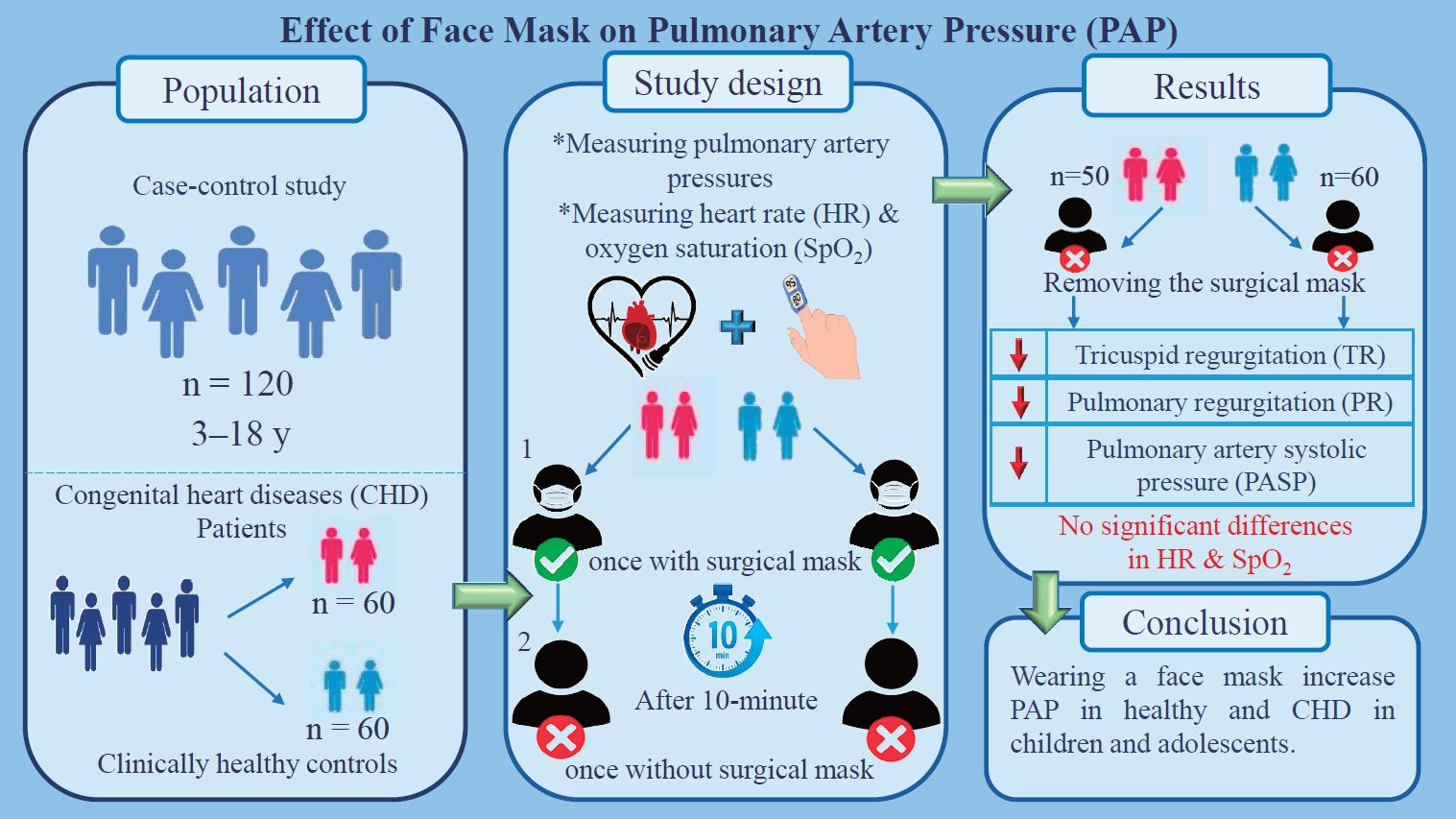
Question: Can face masks alter pulmonary pressure in children and adolescents with and without congenital heart disease?
Findings: Mask removal during echocardiography (ECHO) reduced pulmonary pressure.
Meaning: These findings suggest that face masks should be removed during ECHO in children and adolescents.
- Review Article
- Effects of diethylene glycol contamination of pharmaceutical products on unexplained acute kidney injury in children: a systematic review
- Sani Soleman, Muhammad Adnan, Hilmi Sudiarto, Satria Mahathma, Alya Tazkia, Hana Firdaus, Alfreda Khotijah, Miranti Pramaningtyas, Emi Choironi
-
Unexplained acute kidney injury (AKI) in children owing to diethylene glycol (DEG) contamination during drug production has gained attention in recent years. This qualitative study investigated the effects of DEG exposure on the incidence of unknown AKI in children. A systematic review following the PRISMA (Preferred Reporting Items for Systematic Review and Meta-Analysis) guidelines was proposed to search for studies... -
DOI: https://doi.org/10.3345/cep.2023.01039 [Accepted]
- Review article
- Recent advances in food allergen immunotherapy
- You Hoon Jeon, Edwin H. Kim
-
Food allergies can pose significant risks and profoundly impact the quality of life of children and their families, making them a major public health concern. Allergen avoidance has been the traditional mainstay of treatment; however, recent research has focused on various approaches to food allergen immunotherapy. This review summarizes the recent advancements in oral, sublingual, and epicutaneous immunotherapies, highlighting their... -
DOI: https://doi.org/10.3345/cep.2023.01004 [Accepted]
- Original Article
- Neurology
- Effectiveness of Helmet therapy for infants with moderate to severe positional plagiocephaly
- Jeongho Kim, Jina Kim, Kyu Young Chae
- Clin Exp Pediatr. 2024;67(1):46-53. Published online December 5, 2023
-

Question: Is helmet therapy effective for positional plagiocephaly? What factors influence helmet therapy efficacy for positional plagiocephaly?
Finding: Helmet therapy is effective for infants with moderate to severe positional plagiocephaly, and its effectiveness is influenced by age at treatment initiation, severity of head asymmetry, and daily duration of helmet wear.
Meaning: Pediatricians should initiate helmet therapy for positional plagiocephaly sooner, ideally before 9 months of age, to maximize treatment efficacy.
- Review Article
- Infection
- COVID-19 among infants: key clinical features and remaining controversies
- Nevio Cimolai
- Clin Exp Pediatr. 2024;67(1):1-16. Published online November 27, 2023
-
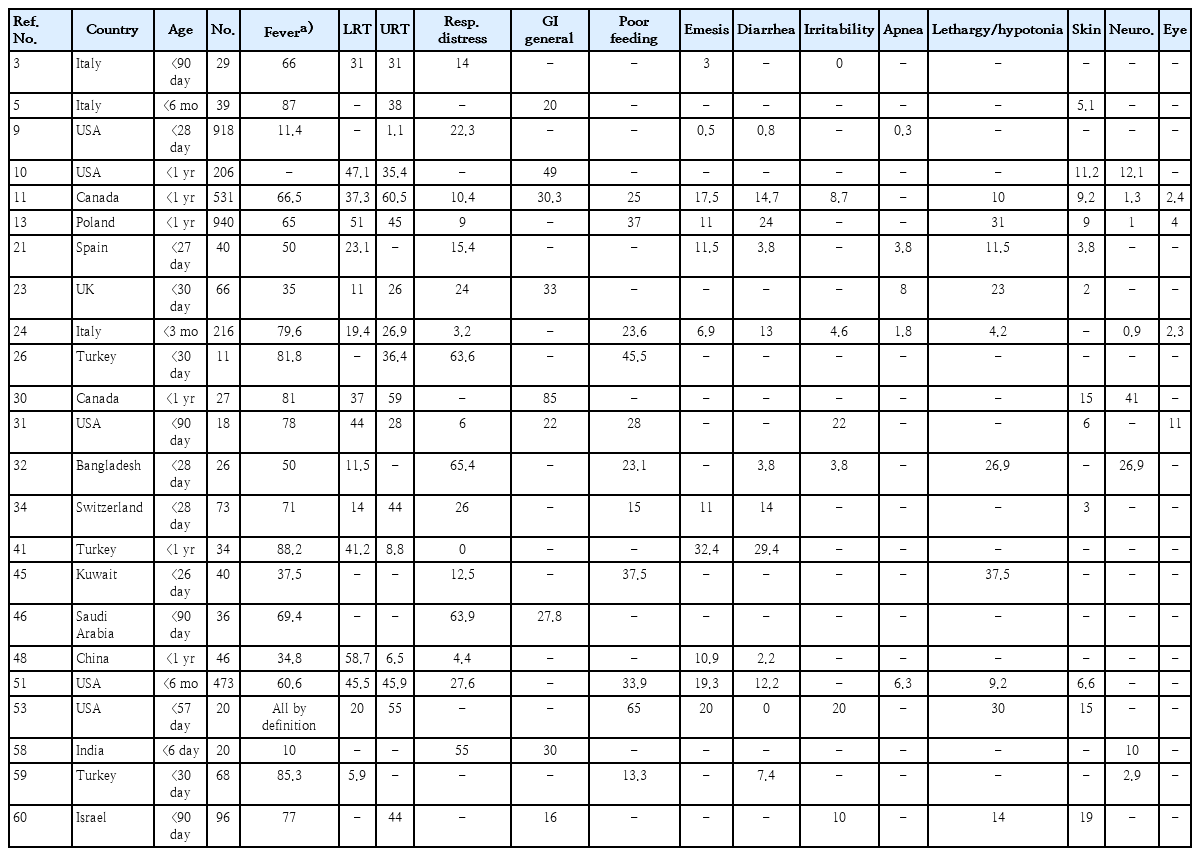
· Clinical studies of coronavirus disease 2019 (COVID-19) in infants should be supported by rigorous laboratory diagnostic criteria.
· Severe acute respiratory syndrome coronavirus 2 (SARS-CoV-2) spreads to infants similarly to other viral respiratory infections.
· Among infants ≤1 year of age beyond the immediate postpartum period, COVID-19 is relatively mild, but even the low risk of severe disease requires prevention.
· Comorbidities increase infection vulnerability and complications in infants.
· Clinical and laboratory data do not sufficiently distinguish COVID-19 from other respiratory viral infections.
· Coinfection with SARS-CoV-2 is uncommon among infants.
· Unique infection sequelae, including multi-inflammatory syndrome in children and neonates and long COVID require further study and refinement of diagnostic criteria.
· Infection control standards applied to mother-infant dyads should be tempered by standard preventive strategies, maternal input, accommodation potential, and overall safety.
· Maternal vaccination prevents disease in early infancy.
- Metabolic complications of obesity in children and adolescents
- Hyunjin Park, Jung Eun Choi, Seunghee Jun, Hyelim Lee, Hae Soon Kim, Hye Ah Lee, Hyesook Park
-
The global prevalence of childhood and adolescent obesity, exacerbated by the COVID-19 pandemic, is affecting not only school-aged children but also preschoolers. Early-onset obesity, along with a higher risk of metabolic complications, may contribute to a lower age of onset of cardiovascular disease (CVD). As metabolic diseases such as diabetes, dyslipidemia, and non-alcoholic fatty liver disease (NAFLD) observed in adulthood... -
DOI: https://doi.org/10.3345/cep.2023.00892 [Accepted]
- Association of prenatal and postnatal exposure to some endocrine-disrupting chemicals with birth and neurodevelopmental outcomes: an extensive review
- Ozge Yesildemir, Mensure Nur Celik
-
Endocrine-disrupting chemicals (EDCs) are natural or human-made chemicals that can mimic, block, or interfere with the body's hormones. The most common and well-studied EDCs are bisphenol A, phthalate, and persistent organic pollutants, including polychlorinated biphenyls, polybrominated diphenyl ethers, per- and polyfluoroalkyl substances, other brominated flame retardants, organochlorine pesticides, dioxins, and furans. Humans are constantly exposed to EDCs through air, diet,... -
DOI: https://doi.org/10.3345/cep.2023.00941 [Accepted]
- Original Article
- Neonatology (Perinatology)
- Prevalence of anxiety, depression, and stress among parents of neonates admitted to neonatal intensive care unit: a systematic review and meta-analysis
- Asha P. Shetty, Kurvatteppa Halemani, Alwin Issac, Latha Thimmappa, Sanjay Dhiraaj, Radha K, Prabhaker Mishra, Vijai Datta Upadhyaya
- Clin Exp Pediatr. 2024;67(2):104-115. Published online November 14, 2023
-
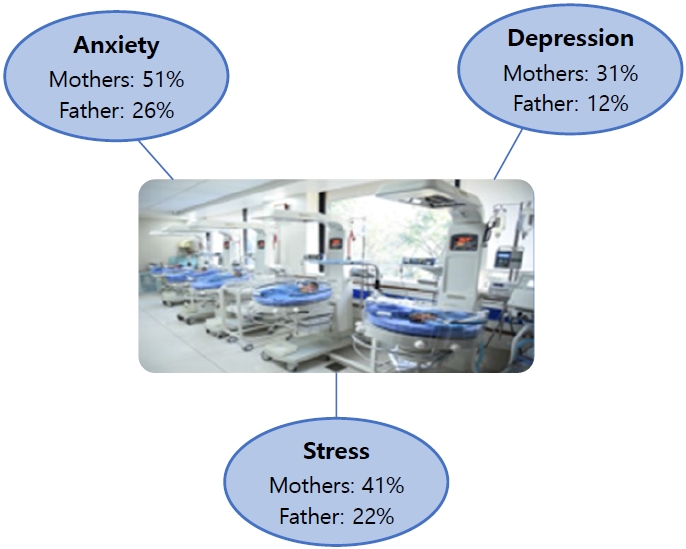
Question: What emotions do parents experience when their newborns are admitted to the neonatal intensive care unit (NICU)?
Finding: Mothers experienced more anxiety (51%), depression (31%), and stress (41%) symptoms than fathers (26%, 12%, and 22%, respectively).
Meaning: Parents often experience anxiety, stress, and depression following NICU admission. Healthcare workers are responsible for providing regular parental counseling.
- Developmental and Behavioral Medicine
- Attention-deficit/hyperactive-impulsive disorder symptoms among grade 1 students with reading disorder in Thailand
- Patcharapun Sarisuta, Issarapa Chunsuwan, Tippawan Hansakunachai, Paskorn Sritipsukho
- Clin Exp Pediatr. 2023;66(11):485-492. Published online October 24, 2023
-

Question: Would students with reading disorder have a significantly higher prevalence of attention-deficit/hyperactiveimpulsive disorder (ADHD) symptoms than neurotypical students?
Finding: Students at risk of reading disorder exhibited significant ADHD symptoms compared with those not at risk of reading disorder according to all presentations of teacher assessments versus only for predominantly inattentive presentations of the parental assessments.
Meaning: Students with reading disorder have a significantly higher prevalence of ADHD symptoms than neurotypical students. Sex, parental education level, average family income, and children’s school affiliation significantly influenced reading disorder prevalence.
- Impact of short and intensive art-based intervention on symptomatology and social interactions among children with autism spectrum disorder
- Deldar Morad Abdulah, Bayar Mohammed Omar Abdulla, Pranee Liamputtong
- Clin Exp Pediatr. 2023;66(10):447-454. Published online September 14, 2023
-
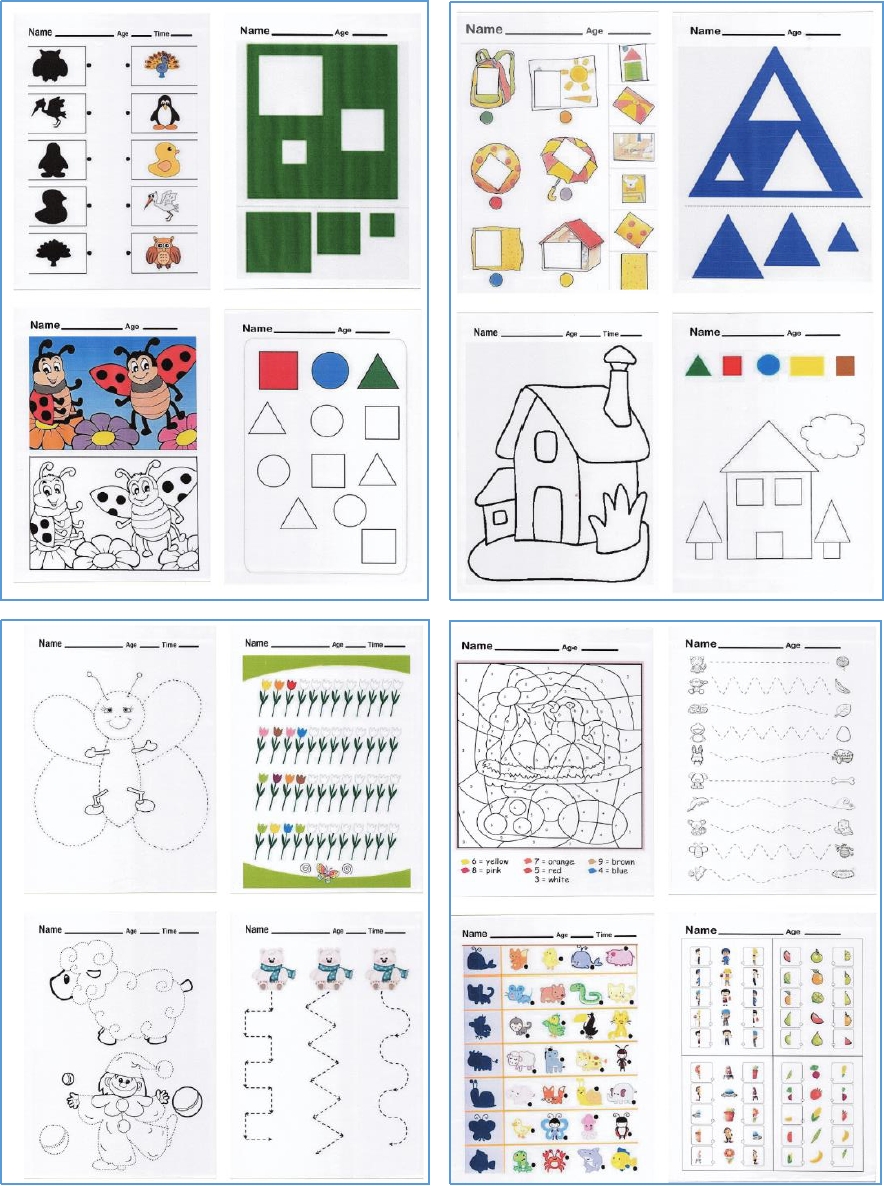
Question: Does a short and intensive art-based intervention affect symptoms and social interactions among children with autism spectrum disorder (ASD)?
Finding: The short and intensive art-based intervention did not affect symptoms in children with ASD level 2 or 3, including social awareness, social cognition, social communication, social motivation, and autistic mannerisms.
Meaning: The short and intensive art-based intervention did not improve the symptoms of patients with ASD.
- Review Article
- Other
- Children’s health affected by parent’s behavioral characteristics: a review
- Sung Eun Kim, Jongin Lee
- Clin Exp Pediatr. 2024;67(5):232-239. Published online August 21, 2023
-

· Parents’ occupational hazards, long working hours, and smoking behaviors should be modified adequately to minimize adverse health effects on their children.
· As of 2023, several diseases from fetal exposure to occupational hazards can be compensated with Industrial Accident Compensation Insurance in South Korea.
· A directed acyclic graph is recommended for medical research to control the effects of parents’ behaviors on children’s health.
- Gastroenterology
- Prevalence, risk factors, and treatment of small intestinal bacterial overgrowth in children
- Yu Kyung Cho, Jin Lee, Chang Nyol Paik
- Clin Exp Pediatr. 2023;66(9):377-383. Published online August 21, 2023
-
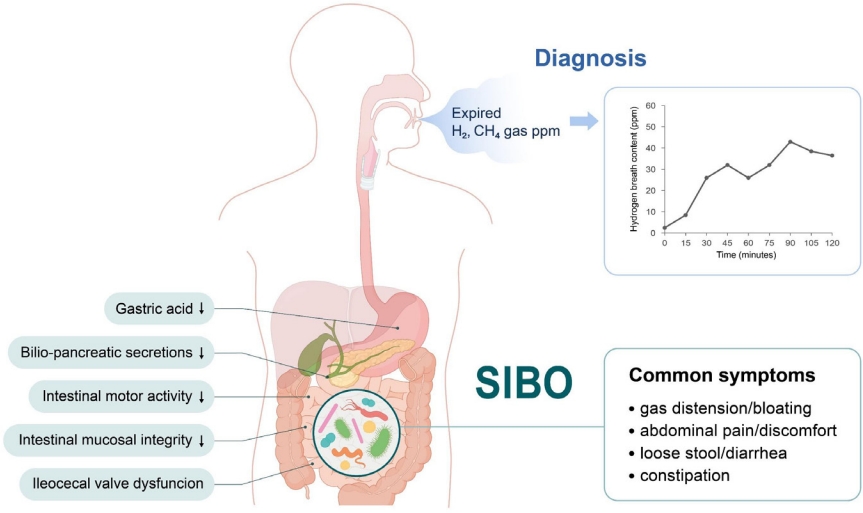
· Pediatric small intestinal bacterial overgrowth (SIBO) manifestations range from nonspecific abdominal symptoms to malabsorption or malnutrition.
· SIBO is prevalent in children and adolescents with functional abdominal pain disorders.
· Predisposing factors include disturbed intestinal motility, altered anatomy, and/or abnormal body defense systems against intestinal bacteria.
· Breath tests are safe and noninvasive.
· Treatment principles include managing predisposing conditions, nutritional support, symptom control, and antibiotics.
- Original Article
- Developmental and Behavioral Medicine
- Neonatal risk factors associated with attention-deficit/hyperactivity disorder: an umbrella review
- Ensiyeh Jenabi, Erfan Ayubi, Sajjad Farashi, Saeid Bashirian, Fereshteh Mehri
- Clin Exp Pediatr. 2023;66(10):441-446. Published online July 14, 2023
-
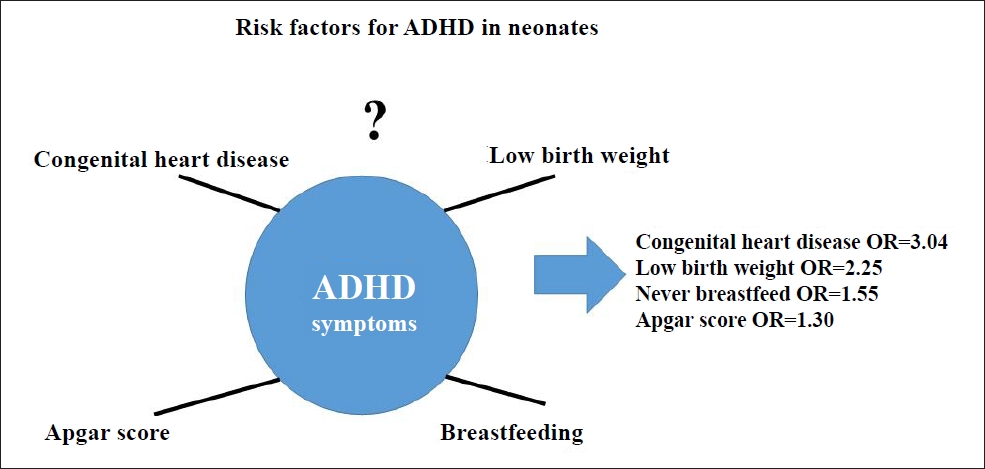
Question: The risk factors for attention deficit hyperactivity disorder (ADHD), such as breastfeeding, congenital heart disease, and low birth weight, in neonates are not well understood.
Finding: This umbrella review obtained significant effect sizes for ADHD for congenital heart disease (odds ratio [OR], 3.04), low birth weight (OR, 2.25), never breastfed (OR, 1.55), and Apgar score (OR, 1.30).
Meaning: Congenital heart disease, low birth weight, lack of breastfeeding, and Apgar scores were significant factors for ADHD.
- Review Article
- Neonatology (Perinatology)
- Updates in neonatal resuscitation: routine use of laryngeal masks as an alternative to face masks
- Eun Song Song, Ga Won Jeon
- Clin Exp Pediatr. 2024;67(5):240-246. Published online July 11, 2023
-

In neonatal resuscitation:
· Laryngeal masks are recommended when endotracheal intubation or positive-pressure ventilation fails.
· Laryngeal masks are useful even during chest compressions.
· Laryngeal masks aid neonates >34 weeks’ gestation and/or with a birth weight >2 kg.
· Main usage barriers include limited experience (81%), preference for endotracheal tubes (57%), and lack of awareness (56%).
· Second-generation laryngeal masks have a built-in esophageal drainage tube that prevents regurgitation into the glottis, and an orogastric tube can be inserted within the esophageal drainage tube to protect against gastric inflation.
- Nephrology (Genitourinary)
- Kidney complications associated with COVID-19 infection and vaccination in children and adolescents: a brief review
- Hee Sun Baek, Min Hyun Cho
- Clin Exp Pediatr. 2023;66(10):424-431. Published online June 28, 2023
-
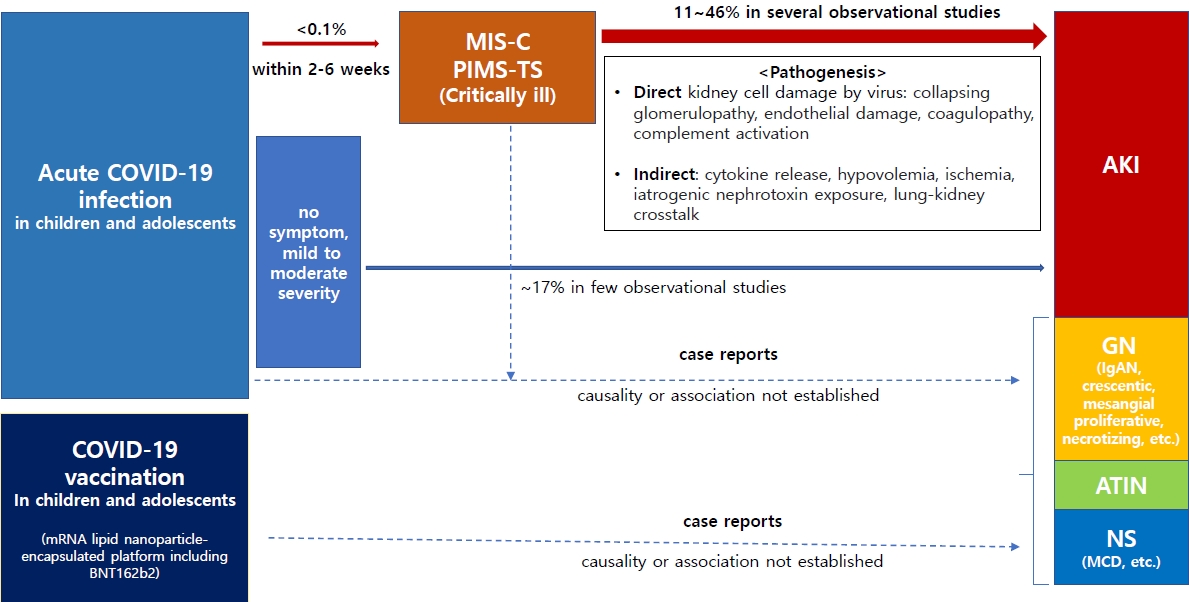
Several observational studies have shown that acute kidney injury affects up to 46% of children and adolescents who develop severe postinflammatory responses, such as multisystem inflammatory syndrome in childhood, due to coronavirus disease 2019 (COVID-19). Although causality has not been established, some cases of glomerulopathy or nephrotic syndrome occurring after COVID-19 infection or vaccination have been reported. Therefore, kidney complications associated with these conditions in children and adolescents warrant attention.
- Development of orphan drugs for rare disease
- Han-Wook Yoo
-
Most rare diseases(orphan diseases) still lack approved treatments despite major advances in research providing the tools to understand their molecular basis, as well as legislation providing regulatory and economic incentives to expedite the development of specific therapies. Addressing this translational gap is a multifaceted challenge, for which a key aspect is the selection of the optimal therapeutic modality for translating... -
DOI: https://doi.org/10.3345/cep.2023.00535 [Accepted]
- Cardiology
- Heart failure in children and adolescents: an update on diagnostic approaches and management
- Amit Agrawal, Dalwinder Janjua, Abdulrahman Ahmed Alsayed Ali Zeyada, Ahmed Taher Elsheikh
- Clin Exp Pediatr. 2024;67(4):178-190. Published online June 19, 2023
-
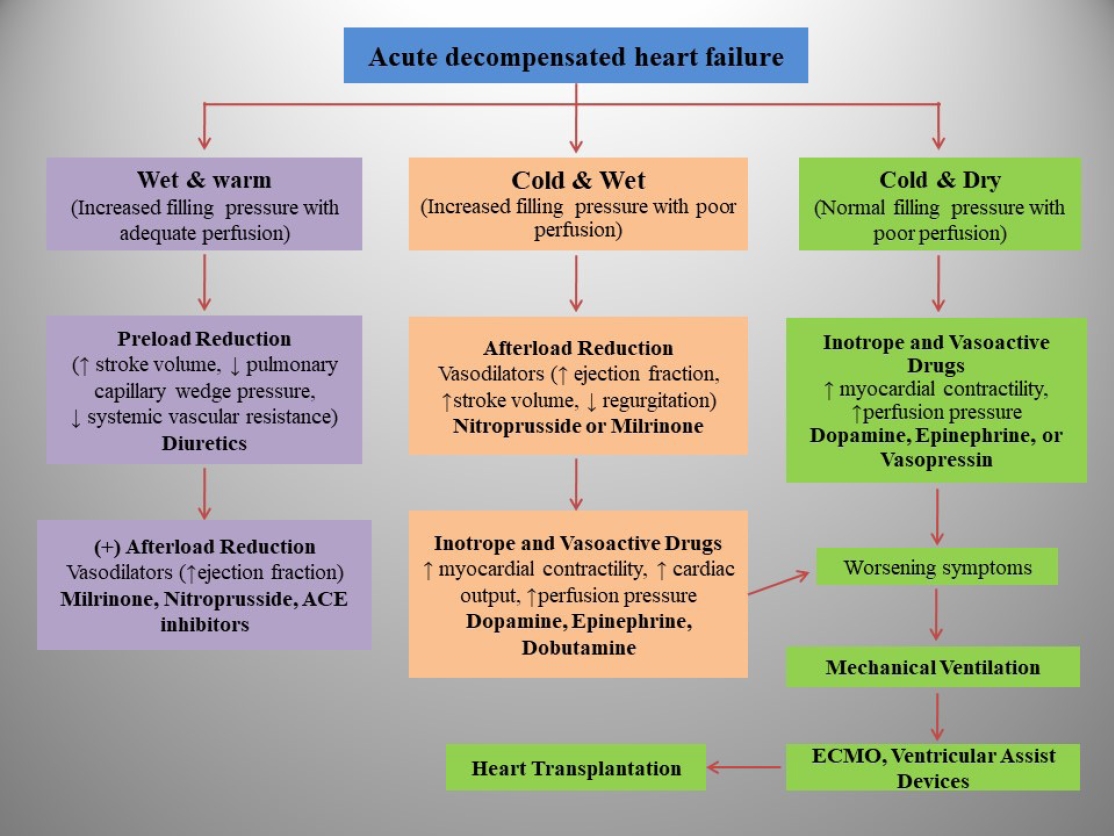
· Pediatric heart failure (PHF) is a clinical syndrome featuring various symptoms (shortness of breath, ankle swelling, fatigue) and signs (pulmonary crackles, peripheral edema).
· Congenital heart diseases are the most common underlying etiology of PHF, whereas myocarditis and primary cardio-myopathies are common in children without structural ab-normalities.
· PHF pathophysiology is complex and multifactorial and varies by etiology and age.
· PHF management includes decongestive therapy, treatment of underlying causes, preventing progression, and managing pulmonary or systemic obstructions.
· Drugs should be chosen based on pharmacodynamics, clinical manifestations, hemodynamic state, and renal function.
- Allergy
- Practical issues of oral immunotherapy for egg or milk allergy
- Sukyung Kim, Kangmo Ahn, Jihyun Kim
- Clin Exp Pediatr. 2024;67(3):140-148. Published online June 19, 2023
-

· Oral immunotherapy should be supervised by pediatricians with experience administering oral food challenge tests and managing allergic reactions.
· Food allergen intake is gradually increased and maintained for years.
· Patients may experience allergic reactions and psychological problems.
· Adjunctive therapies (biologics, antihistamines, and leukotriene receptor antagonists) may improve efficacy and safety.
· Contraindications include uncontrolled asthma, malignancy, active autoimmune disorders, and beta-blocker usage.
- Pulmonology
- Long COVID in children and adolescents: prevalence, clinical manifestations, and management strategies
- Eun Kyo Ha, Ju Hee Kim, Man Yong Han
- Clin Exp Pediatr. 2023;66(11):465-474. Published online June 19, 2023
-

· Current definitions of long coronavirus disease (COVID) in children and adolescents vary in duration, ranging from 4 to 12 weeks or more.
· The clinical spectrum of long COVID in children and adolescents comprises a wide range of symptoms and might be a multisystem disorder.
· Persistent health problems with a prevalence of 1%–66.5% were reported in children and adolescents after COVID-19, with a higher incidence of persistent single or multiple symptoms.
- Neonatology (Perinatology)
- Neonatal family-centered care: evidence and practice models
- Juyoung Lee
- Clin Exp Pediatr. 2024;67(4):171-177. Published online June 14, 2023
-
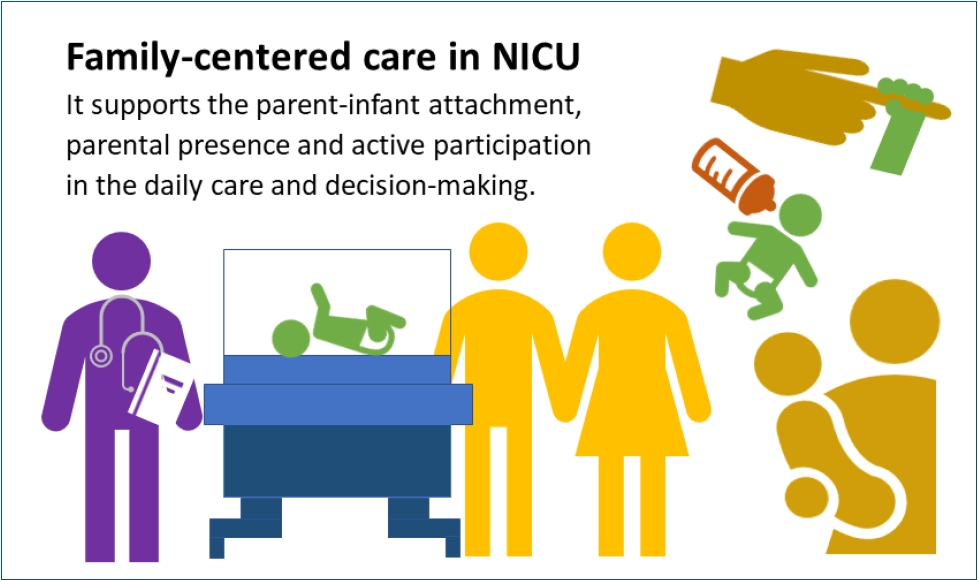
· Concrete evidence exists of early parent-infant attachment supported by family-centered care (FCC) in the neonatal intensive care unit.
· FCC involves the parents’ presence and participation in the infant’s care and decision-making.
· A private and comfortable space should be provided. A single-family room is ideal; however, a quiet space with a recliner can be a good alternative.
· Care culture changes and staff training are required.
- Other
- Acetaminophen causes neurodevelopmental injury in susceptible babies and children: no valid rationale for controversy
- Lisa Zhao, John P. Jones, Lauren G. Anderson, Zacharoula Konsoula, Cynthia D. Nevison, Kathryn J. Reissner, William Parker
- Clin Exp Pediatr. 2024;67(3):126-139. Published online June 14, 2023
-
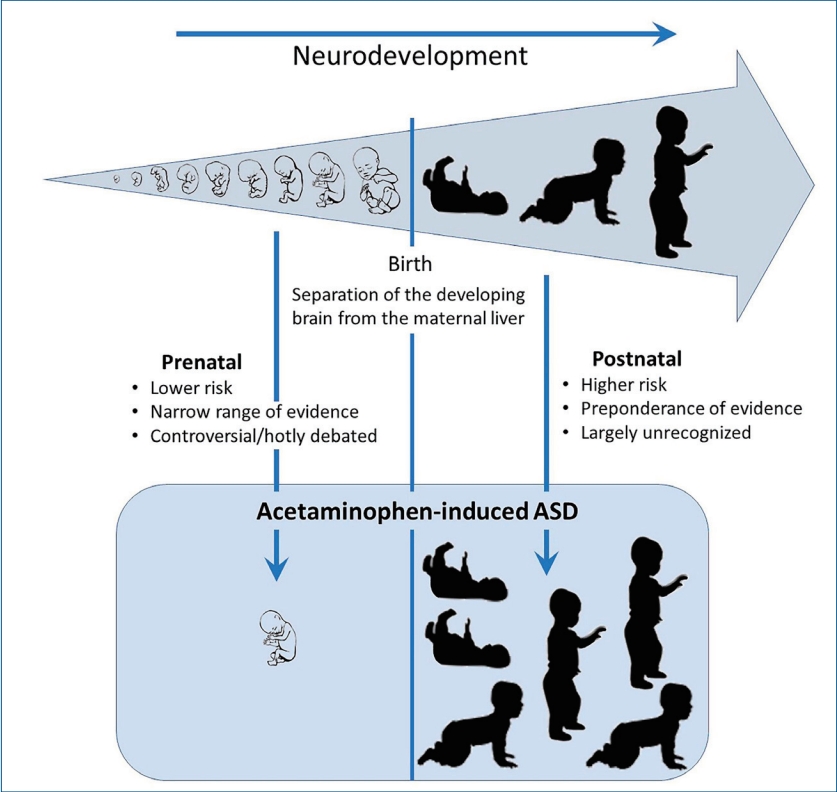
Despite worldwide acceptance of acetaminophen (paracetamol) in pediatric medicine, careful examination reveals no valid objections to the conclusion that early exposure to acetaminophen causes neurodevelopmental injury in susceptible babies and children. Nevertheless, debate that early exposure to acetaminophen causes neurodevelopmental injury has centered around the prenatal period, evidence of which is relatively limited compared to that in the postnatal period, which is the time of greatest absolute and relative risk.
- Infection
- Community-acquired pneumonia in children: updated perspectives on its etiology, diagnosis, and treatment
- Ki Wook Yun
- Clin Exp Pediatr. 2024;67(2):80-89. Published online June 14, 2023
-
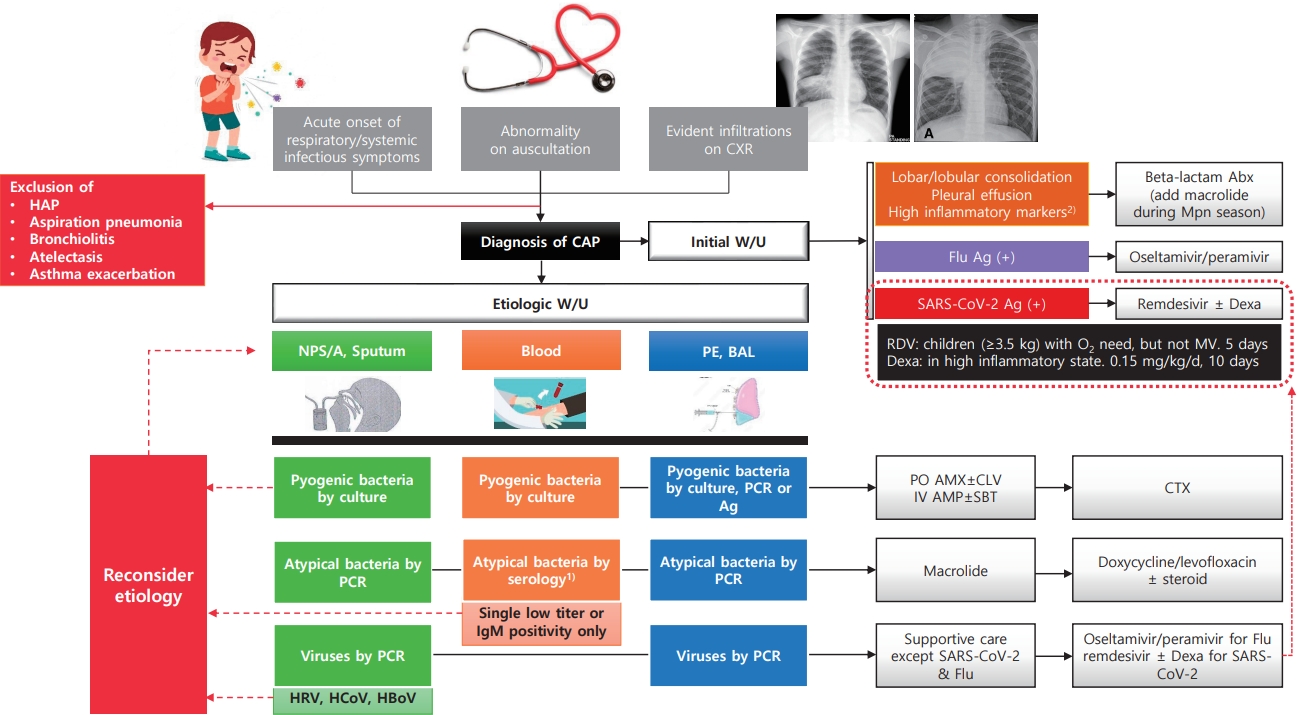
· Most commonly confirmed causes of community-acquired pneumonia (CAP) in children are Mycoplasma pneumoniae (8%–40%) and respiratory syncytial virus (15%–20%).
· Pyogenic bacteria, most commonly Streptococcus pneumoniae (40%–50%) and Streptococcus pyogenes (10%–25%), are detected in 2%–5% of children hospitalized with CAP.
· CAP should be diagnosed conservatively according to clinical and radiological criteria.
· The etiology should be identified via appropriate test result interpretation.
- Allergy
- Moderate to severe atopic dermatitis in children: focus on systemic Th2 cytokine receptor antagonists and Janus kinase inhibitors
- Jeong Hee Kim, Mona Salem Samra
- Clin Exp Pediatr. 2024;67(2):64-79. Published online June 14, 2023
-

· Atopic dermatitis (AD) is characterized by a strong T helper (Th)2 response, although the extents of Th22, Th17/ interleukin (IL)-23, and Th1 responses vary among disease subtypes.
· Children with moderate to severe AD may require early systemic therapy to reduce the systemic inflammation caused by increased Th2 cytokine levels.
· Dupilumab, which blocks IL-4/IL-13 receptor, has equivalent efficacy for extrinsic and intrinsic AD and a favorable safety profile in infants and children aged 6 months and older.
- Gastroenterology
- High-resolution anorectal manometry in children
- Yogesh Waikar
- Clin Exp Pediatr. 2024;67(2):57-63. Published online June 14, 2023
-

· Anorectal manometry is safe in children.
· Defecation Dyssynergia is one of the commonest cause of chronic constipation.
· Positive Rectoanal inhibiory reflex rules out Hirschsprung's Disease
- Developmental and Behavioral Medicine
- Clinical practice guidelines for attention-deficit/hyperactivity disorder: recent updates
- Tae Hoon Eom, Young-Hoon Kim
- Clin Exp Pediatr. 2024;67(1):26-34. Published online June 14, 2023
-
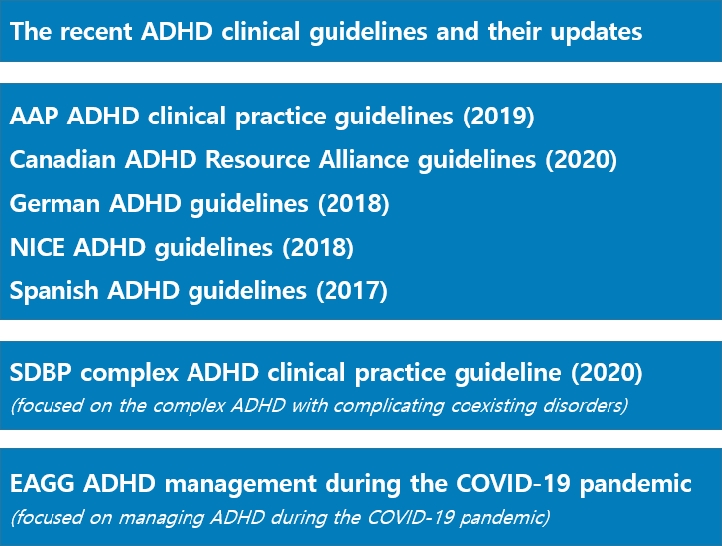
· Primary pediatricians should play a key role in the diagnosis and treatment of attention-deficit/hyperactivity disorder (ADHD).
· The Diagnostic and Statistical Manual of Mental Disorders, fifth edition, has lowered the diagnostic threshold for older teens and adults and a comorbid diagnosis with autism is now allowed.
· The American Academy of Pediatrics had added recommendation-related comorbid conditions in its guideline and the Society of Developmental and Behavioral Pediatrics recently developed a complex ADHD guideline.
· The European ADHD Guideline Group recently developed a guideline for managing ADHD during the coronavirus disease 2019 pandemic.
- Nephrology (Genitourinary)
- X-linked hypophosphatemic rickets: from diagnosis to management
- Eujin Park, Hee Gyung Kang
- Clin Exp Pediatr. 2024;67(1):17-25. Published online June 14, 2023
-
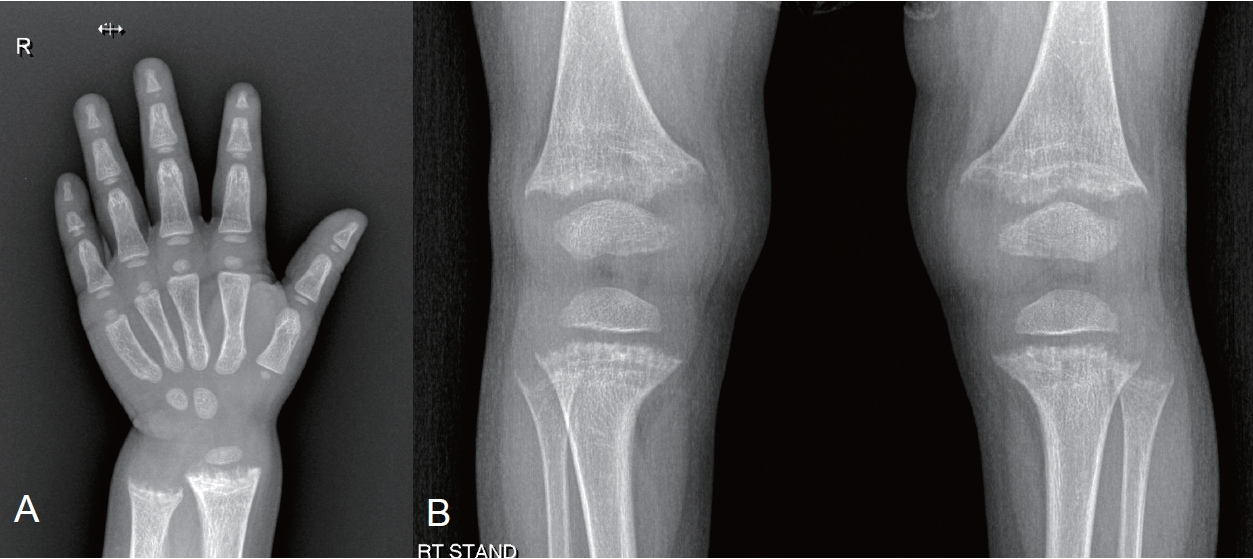
· X-linked hypophosphatemia (XLH), the most common cause of hypophosphatemic rickets, affects 1/20,000 people.
· XLH is caused by a loss-of-function mutation of the PHEX gene.
· Its main pathogenesis is elevated fibroblast growth factor-23 (FGF23) level.
· Burosumab, an FGF23 inhibitor, was developed in the early 2000s.
· Burosumab was approved in Korea in 2020 for XLH patients aged 1+ years with radiographic evidence of bone disease.
-

-
-

-

-
Impact Factor4.2
-
6.52022CiteScore92nd percentilePowered by







